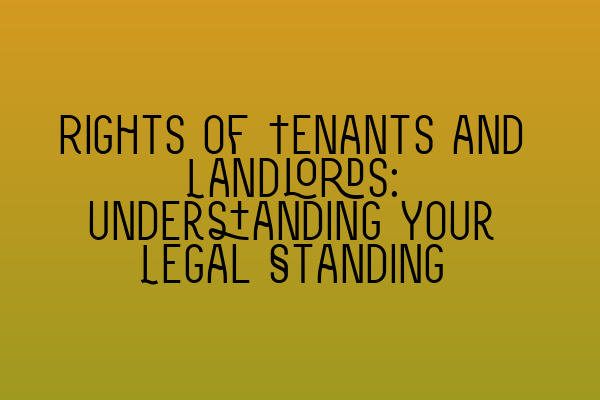**Rights of Tenants and Landlords: Understanding Your Legal Standing**
As a tenant or landlord, it is essential to be well-versed in your legal rights and obligations. Understanding the laws that govern the landlord-tenant relationship can help you navigate potential disputes and protect your interests. In this blog post, we will explore the various rights of tenants and landlords to provide you with a comprehensive understanding of your legal standing.
**Rights of Tenants**
Tenants have a range of rights that are designed to ensure their well-being and protect them from unfair treatment. Familiarizing yourself with these rights can help you assert your position and resolve any issues that may arise during your tenancy.
1. **Right to a Safe and Habitable Property**: As a tenant, you have the right to live in a property that is safe, clean, and fit for habitation. This means that your landlord is responsible for maintaining the property’s structural integrity, ensuring proper sanitation and plumbing, and addressing any potential health hazards.
2. **Right to Privacy**: Tenants have the right to privacy within their rented property. Landlords cannot enter the premises without notice or without a valid reason, except in the case of emergencies.
3. **Right to Quiet Enjoyment**: The right to quiet enjoyment ensures that tenants can peacefully enjoy their rented property without interference from the landlord. This includes freedom from unreasonable disturbances and harassment.
4. **Right to Proper Notice for Termination**: If your landlord wishes to terminate your tenancy, they must provide you with proper notice in accordance with the terms of your lease agreement or the local tenancy laws. This notice period varies depending on the jurisdiction.
5. **Right to Request Repairs**: If there are any maintenance or repair issues in your rental property, you have the right to request repairs from your landlord. It is their responsibility to address these issues in a timely manner.
6. **Right to Fair Housing**: Tenants are entitled to fair housing, which means that landlords cannot discriminate against them based on factors such as race, religion, gender, disability, or family status.
**Rights of Landlords**
Landlords also have rights that protect their property and ensure the smooth running of their rental business. Understanding these rights can help landlords effectively manage their properties and handle any tenant-related issues.
1. **Right to Collect Rent**: Landlords have the right to collect rent from their tenants in a timely manner, as outlined in the lease agreement. If a tenant fails to pay rent, the landlord can take legal action to recover the unpaid amount.
2. **Right to Evict**: If a tenant violates the terms of the lease agreement, such as by engaging in illegal activities or causing significant damage to the property, the landlord has the right to evict them. However, the eviction process must follow the legal procedures established by the local tenancy laws.
3. **Right to Proper Notice for Entry**: Landlords have the right to enter the rental property for specific reasons, such as conducting repairs, inspections, or showing the property to potential tenants. However, they must provide proper notice to the tenant and respect their right to privacy.
4. **Right to Protect the Property**: Landlords have the right to protect their property from damage caused by tenants. They can hold tenants responsible for any damages beyond normal wear and tear and deduct the cost of repairs from the security deposit.
5. **Right to Lease Termination**: Just as tenants have the right to request repairs, landlords have the right to terminate a lease agreement when necessary. This may be due to non-payment of rent, lease violations, or a desire to sell the property.
6. **Right to Set Rules and Regulations**: Landlords have the authority to establish rules and regulations for their rental properties. These rules should be reasonable, communicated clearly to tenants, and enforced consistently.
Understanding your rights as a tenant or landlord is crucial for maintaining a healthy and respectful relationship. If you encounter any issues that you cannot resolve with the other party, it may be beneficial to seek legal advice to ensure your rights are protected.
For detailed information on various legal topics related to property law and land law, we offer comprehensive preparation courses for the SQE 1 and SQE 2 exams. Our SQE 1 Practice Exam Questions and SQE 1 Practice Mocks FLK1 FLK2 can help you test your knowledge and enhance your understanding of property law.
If you’re interested in learning more about our SQE preparation courses and the upcoming SRA SQE Exam Dates, visit our website. Our team of experts is dedicated to providing you with the resources and support you need to succeed in your legal career.
Remember, knowledge is power. By familiarizing yourself with your rights and obligations as a tenant or landlord, you can ensure a smooth and harmonious rental experience for both parties involved.
